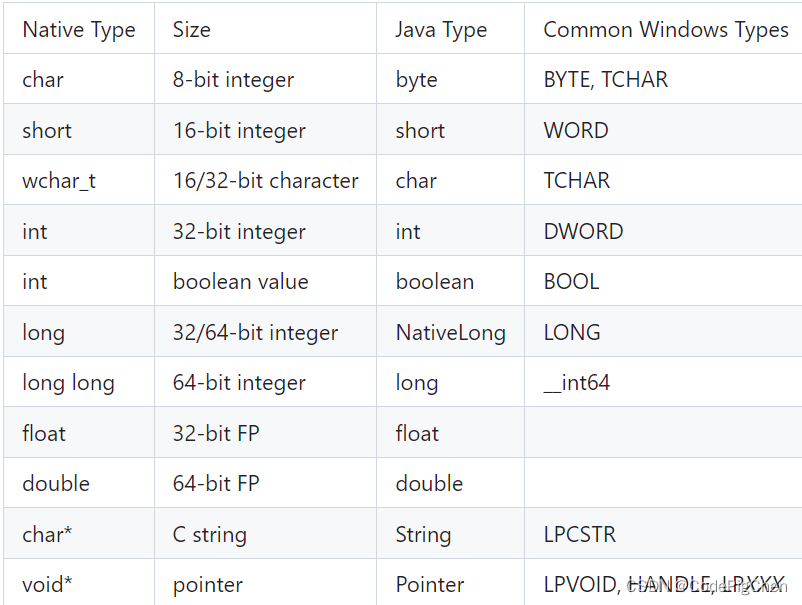【JNA与C++基本使用示例】
发布时间:2023年12月18日
JNA关系映射表

使用案列
注意
- JNA只支持C方式的dll
- 使用C++的char* 作为返回值时,需要返回的变量为malloc分配的地址
- C++的strlen函数只获得除/0以外的字符串长度
代码示例
C++代码
// 下列 ifdef 块是创建使从 DLL 导出更简单的
// 宏的标准方法。此 DLL 中的所有文件都是用命令行上定义的 TESTJNA_EXPORTS
// 符号编译的。在使用此 DLL 的
// 任何项目上不应定义此符号。这样,源文件中包含此文件的任何其他项目都会将
// TESTJNA_API 函数视为是从 DLL 导入的,而此 DLL 则将用此宏定义的
// 符号视为是被导出的。
#ifdef TESTJNA_EXPORTS
#define TESTJNA_API __declspec(dllexport)
#else
#define TESTJNA_API __declspec(dllimport)
#endif
#include<vector>
#include<string>
#include<nlohmann/json.hpp>
using json = nlohmann::json;
//头文件
extern "C" TESTJNA_API const char* testJNAPlusJson(int arr[], const char* arr2);
//cpp
const char* testJNAPlusJson(int arr[], const char* arr2)
{
json j = json::parse(arr2);
std::vector<std::vector<int>> resVector = j.get<std::vector<std::vector<int>>>();
//序列化为字符串
json ressd(resVector);
std::string dasd = ressd.dump();
auto suibian = dasd.length()+1;//实际的字符串长度
const char* hhh = dasd.c_str();//c字符串
char* resfinal = (char*)malloc(suibian);// char* 返回值分配的
strcpy_s(resfinal, suibian,hhh);
free(resfinal );
return resfinal;
}
java代码
public class JNATestPlus {
public interface CTest extends Library {
CTest INSTANCE = (CTest)
Native.load("TESTJNA.dll",CTest.class);
String testJNAPlusJson(int[] arr, String arr2);
}
static {
URL resource = JNATestPlus.class.getClassLoader().getResource("./libs/TESTJNA.dll");
String path = resource.getPath();
System.load(path);
}
public static void main(String[] args) {
int[] arr = {1,2};
int[][] arr2 ={{1,2},{1,2}};
String s2 = JSON.toJSONString(arr2);
String s1 = CTest.INSTANCE.testJNAPlusJson(arr, s2);
System.out.println(s1);
}
}
文章来源:https://blog.csdn.net/weixin_44022891/article/details/134956653
本文来自互联网用户投稿,该文观点仅代表作者本人,不代表本站立场。本站仅提供信息存储空间服务,不拥有所有权,不承担相关法律责任。 如若内容造成侵权/违法违规/事实不符,请联系我的编程经验分享网邮箱:chenni525@qq.com进行投诉反馈,一经查实,立即删除!
本文来自互联网用户投稿,该文观点仅代表作者本人,不代表本站立场。本站仅提供信息存储空间服务,不拥有所有权,不承担相关法律责任。 如若内容造成侵权/违法违规/事实不符,请联系我的编程经验分享网邮箱:chenni525@qq.com进行投诉反馈,一经查实,立即删除!
最新文章
- Python教程
- 深入理解 MySQL 中的 HAVING 关键字和聚合函数
- Qt之QChar编码(1)
- MyBatis入门基础篇
- 用Python脚本实现FFmpeg批量转换
- QT+OSG/osgEarth编译之七十七:gz+Qt编译(一套代码、一套框架,跨平台编译,版本:OSG-3.6.5插件库osgdb_gz)
- Linux常用指令
- 在Maven中设置JVM系统参数及Java应用调试实例
- 加载postgis报错,无法加载库 “C:/Program Files/PostgreSQL/9.6/lib/rtpostgis-2.4.dll“:
- 【Git】查看凭据管理器的账号信息,并删除账号,解决首次认证登录失败后无法重新登录的问题
- Windows.OpenSSL生成ssl证书配置到nginx
- 跨境电商卖家都在用的海外云手机
- 研0或研一|如何快速入门深度学习?
- MySQL 事务
- 启动springboot时报错 APPLICATION FAILED TO START 包冲突